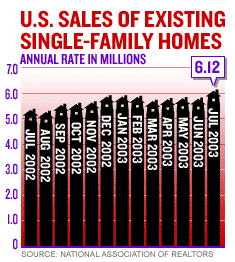NEW YORK (CNN/Money) -
If you're being deafened by the sound of hammering and sawing in your neighborhood, as one or five or 20 new houses are built around you, you might think the U.S. housing boom is stronger than ever.
Well, it may be, but it's probably not going to last much longer.
The National Association of Realtors said Monday that sales of existing homes, the biggest part of the housing market, jumped to a record pace in July. That followed last week's government report that new home construction hit its strongest pace in 17 years.

Though the nation's housing market is unlikely to fall off a cliff, many economists believe it's probably at or near the peak that prices have been climbing for the past few years.
"We expect home sales will drop marginally -- about 3 percent -- in each of the next two years from this year's level, which will be an all-time record," said Douglas Duncan, chief economist at the Mortgage Bankers Association of America.
The reason for the MBAA's tempered outlook is the recent dramatic rise in mortgage rates. After tumbling to record lows in June, rates accelerated in July and early August and last week were a full percentage point higher than their record low in June, according to the latest data from mortgage security firm Freddie Mac.
With rates still low by historical standards, the rise in late July pushed many potential buyers into the market in one last rush; but the pace of mortgage applications has already started to drop, heralding the end of this year's mad rush.
| Related stories
|

|
|
|
|
"The rising mortgage rates have pushed us to a new record home-sales level, but once the fence sitters are all down, things could change," said Joel Naroff, president and chief economist of Naroff Economic Advisors in Holland, Pa.
Some analysts think stronger economic growth -- which most forecasters believe has already begun -- will help lift demand for housing. But some economists worry that won't be enough to offset the impact of higher rates.
For one thing, some speculators who were hoping to make a killing in the home market might move on to greener pastures, including the stock market, when they see home-price gains slow. Their exodus could cut demand and put downward pressure on prices.
| 
| |

| 
| 
|

|
 Mortgage applications fell last week to their lowest level in more than a year. Still, economists say there is evidence that the housing market remains healthy. CNNfn's Kathleen Hays reports. Mortgage applications fell last week to their lowest level in more than a year. Still, economists say there is evidence that the housing market remains healthy. CNNfn's Kathleen Hays reports.
|
 Play video
Play video
(Real or Windows Media)
|
| 
|

|
|
What's more, though household income has been climbing slowly and steadily -- despite the longest stretch of labor-market weakness since World War II -- it can't compete with the abrupt jump in mortgage rates, driven by a 42 percent surge in the 10-year Treasury yield since mid-June.
If wages can't keep up with rates, then first-time buyers will simply be able to afford less house, putting further downward pressure on demand.
"The indicator that economists use to predict the housing market is the affordability index -- the ratio of monthly income to monthly mortgage payments," said Ethan Harris, chief economist at Lehman Brothers. "As the economy picks up, the typical family's monthly income will slowly accelerate, but the monthly mortgage cost is quickly jumping, much faster than income could possibly move."
No bubble, but no boost, either
Housing has been so strong for so long that some economists have occasionally fretted that home prices were expanding into a dangerous bubble, similar to the bubble in technology-stock prices that popped in 2000, soaking investors.
But most economists dismiss that idea, and the coming drop in home sales and home prices likely won't come all at once.
Though the Commerce Department said homes were built at the fastest pace in 17 years in July, there's still a relative shortage of supply, and permit issuance -- a more forward-looking indicator -- did slack off last month, a hint of some sobriety on the part of homebuilders.
"The market has some adjustment to do, but it will be more of a slow leak than a pop," Harris said.
The lingering effect of this summer's earlier low rates -- including the rapid pace of homebuilding, as well as increased sales of furniture, appliances and other home and garden supplies -- likely will boost economic growth in the third quarter, many economists said.
After that, however, with the refinancing boom ancient history and home sales slowing, the housing market, which has basically carried the weak economy on its back in recent years, will have to be relieved of duty.
"The economy is picking up from a pathetic pace to something better, but the big question is what happens next year, when there's no more tax cuts and mortgage refinancing to boost growth," said Rory Robertson, interest-rate strategist at Macquarie Equities (USA).
"Will the jump in growth now kick-start a whole production-income-spending cycle, so that we get a self-sustaining expansion? That's an open question."

This is an updated version of a story that originally ran on Aug. 19, 2003.
|

